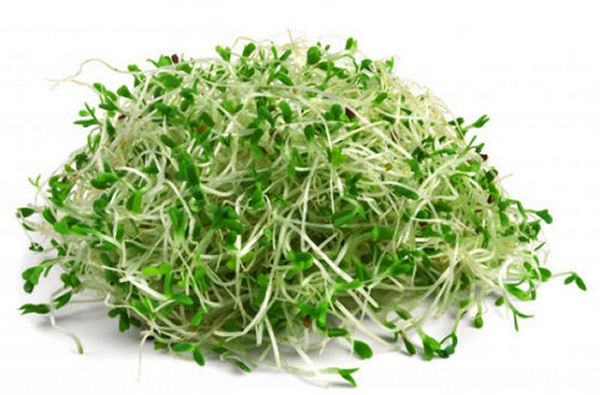
What is Alfalfa?
Alfalfa is a plant which sends its roots down twenty to thirty feet into the ground and brings up the minerals that are not available on the surface. For this reason, the Arabic word Alfalfa means "father of plants" or "best forage". Alfalfa is rich in vitamins, minerals and other nutrients that play a vital role in the strength and growth of our bones and in the maintenance of a healthy body. It contains protein and vitamin A, vitamin B1, vitamin B6, vitamin C, vitamin E, and vitamin K. It also contains calcium, potassium, carotene, iron, and zinc. It can be taken in the form of seeds, leaves or tablets.
What are the Benefits of Alfalfa?
Alfalfa has been used by the Chinese since the sixth century to treat several health conditions. It is considered the richest land source of trace minerals. Rich in vitamins, minerals and other nutrients Alfalfa makes an amazing herbal remedy. Its specific benefits include:
- Relieving kidney problems, and relieving fluid retention and swelling.
- Helping with auto-immune disorder.
- Healing arthritis.
- Nourishing the digestive, skeletal, glandular and urinary system.
- Cleansing the blood, liver and bowel.
- 1Lowering cholesterol levels.
- Preventing strokes.
- Healing whooping cough.
Uses of Alfalfa
Home Remedy for Arthritis
Alfalfa is naturally rich in minerals such as calcium, magnesium, and vitamin K, which support bone health. In traditional herbal medicine, alfalfa tea—made from its leaves or seeds—has been used to ease joint discomfort. While some studies suggest that alfalfa may have anti-inflammatory and antioxidant effects, there is limited scientific evidence to confirm its effectiveness in the treatment of arthritis. For most people, moderate use is considered safe, but those with autoimmune conditions or taking blood thinners should consult a healthcare professional before use. 3
Home Remedy for Diabetes
2Alfalfa leaves and seeds are the parts most commonly used to support blood sugar management. The leaves are rich in fiber, saponins, and flavonoids, which may help slow glucose absorption in the gut, and are often consumed as teas or powders. Alfalfa seeds contain compounds like coumarins and triterpene saponins that may improve insulin sensitivity and glucose metabolism, and they can be eaten sprouted or in supplement form. Animal and in vitro studies suggest that both leaves and seeds may be used as a natural treatment for diabetes, and to provide antioxidant benefits. However, alfalfa should be considered a supportive measure rather than a replacement for diabetes medications.
Remedy for Kidney Stones
Vitamins A, C, E and Zinc are proven to help dissolve kidney stones. You can find these vitamins and minerals in Alfalfa powder, Alfalfa leaves, and Alfalfa sprouts.
Drinking alfalfa tea made from its leaves may help support kidney health. Alfalfa is also a natural diuretic, which can increase urine flow and may assist the body in flushing out small kidney stones. Use 1 teaspoon of dried alfalfa leaves steeped in a cup of hot water, once daily. 4
Note: People with autoimmune conditions or on blood thinners should avoid it without medical advice.
Natural Treatment for Hair Loss and Balding
The juice of alfalfa, in combination with equal amounts of carrot and lettuce juice, taken daily, assists in the growth of hair to an amazing extent. The combination of these juices is rich in elements which are especially helpful for the growth of hair and the prevention of hair loss.
What are the Side Effects of Alfalfa?
As with all herbal products, moderation is the key to avoiding adverse reactions. For example,
excessive consumption of alfalfa may cause the breakdown of red blood cells, which is extremely serious.
Research has found that diets high in canavanine, an amino acid found in alfalfa, can aggravate
the disease lupus. However, canavanine is usually only found in the seeds and sprouts of alfalfa but
not in mature leaves. Thus, alfalfa tea and capsules made from leaves are not expected to contain canavanine.
Nevertheless, it is recommended that alfalfa be avoided during pregnancy because of its potential canavanine
content and hormonally active saponins. If you are pregnant, it is recommended that you avoid regular
daily consumption of alfalfa or its supplements.
Where and How to Buy Alfalfa
Alfalfa is available in capsules, which you may take daily as a nutritional supplement. One or two capsules a day is recommended. You can also find bulk alfalfa leaves or seeds at some health food stores which are great for making a nourishing tea.


Hi Portia Clark,
Alfalfa contains compounds called Isoflavones, which are chemically similar to the hormone estrogen. Alfalfa has shown effects on estrogen hormone in menopausal women. According to a study, alfalfa could help reduce hot flashes in menopausal women. For more info, please refer to this research paper. https://pubmed.ncbi.nlm.nih.gov/33348600/
Hope it helps!
Can Alfalfa help with balancing hormones?
Is this plant good for ITP (Idiopathic Thrombocytopenic Purpura) disease? Could you put up its photo?
Very good health information! Thanks.
Enochered, how old is the child? Fresh Alfalfa is safe for children over the age of one.
I have been using alfalfa sprouts and seeds for many years and I do not appear to have suffered from any side affects whatsoever. I visited your site today because the child of a friend is anemic and I was wondering whether the Iron content of alfalfa would be a good remedy?
Celeste LaBelle, Often the package of the medicine suggests the dosage and the duration the herb can consumed for. Usually 6- 8 weeks (about 2 months) is considered long term use. However, it depends on the interactions and side effects of the individual herbal medicine and is decided at your healthcare provider's discretion.
I suffer from early satiety. Does anyone know if Alfalfa helps with this? Thank you!
What is considered long term? Can I take it 2 times a day like a daily vitamin?
It is very informative article for maintaining a good health especially in old age. I am seventy one now.